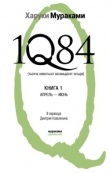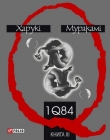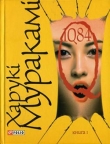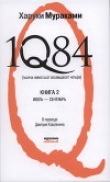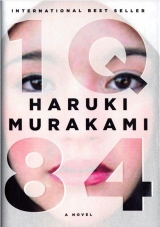
Текст книги "1q84"
Автор книги: Haruki Murakami
Жанр:
Современная проза
сообщить о нарушении
Текущая страница: 75 (всего у книги 81 страниц)
CHAPTER 24
Tengo
LEAVING THE CAT TOWN
Tengo’s father’s corpse was dressed in his neatly ironed NHK fee collector’s uniform and placed inside the simple coffin. Probably the cheapest coffin available, it was a sullen little casket that looked only slightly more sturdy than the boxes for castella cakes. The deceased was a small person, yet there was barely any room to spare. The casket was made of plywood, and had minimal ornamentation. “Is this casket all right?” the funeral director had asked, making sure. “It’s fine,” Tengo replied. This was the casket his father had chosen from the catalog, for which he had prepaid. If the deceased had no problem with it, then neither did Tengo.
Dressed in his NHK uniform, lying in the crude coffin, his father didn’t look dead. He looked like he was taking a nap on a work break and would soon get up, put on his cap, and go out to collect the rest of the fees. The uniform, with the NHK logo sewed into it, looked like a second skin. He was born in this uniform and would leave this world in the same way as he went up in flames. When Tengo actually saw him in it, he couldn’t imagine his father wearing anything else. Just like Wagner’s warriors on their funeral pyre could only be dressed in armor.
Tuesday morning, in front of Tengo and Kumi Adachi, the lid of the coffin was closed, nailed shut, then placed inside the hearse. It wasn’t much of a hearse, just the same businesslike Toyota van they had used to transport his body to the funeral home. This hearse, too, must have been the cheapest available. Stately was the last word you would use to describe it. And there was certainly no Götterdämmerung music as a send-off. But Tengo couldn’t find anything to complain about, and Kumi didn’t seem to have any problems with it either. What was more important was that a person had vanished from the face of the earth, and those left behind had to grasp what that entailed. The two of them got into a taxi and followed the black van.
They left the seaside road, drove a short way into the hills, and arrived at the crematorium. It was a relatively new building but utterly devoid of individuality. It seemed less a crematorium than some sort of factory or government office building. The garden was lovely and well tended, though the tall chimney rising majestically into the sky hinted that this was a facility with a special mission. The crematorium must not have been very busy that day, since the casket was taken right away. The casket was gently laid inside the incinerator, then the heavy lid was shut, like a submarine hatch. The old man in charge, wearing gloves, turned and bowed to Tengo, then hit the ignition switch. Kumi turned to the closed lid and put her hands together in prayer, and Tengo followed suit.
During the hourlong cremation, Tengo and Kumi waited in the building’s lounge. Kumi bought two cans of hot coffee from the vending machine and they silently drank them as they sat side by side on a bench, facing a large picture window. Outside was a spacious lawn, dried up now in the winter, and leafless trees. Two black birds were on one of the branches. Tengo didn’t know what kind of bird they were. They had long tails, and though small, they gave loud, sharp squawks. When they called out, their tails stood on end. Above the trees was the broad, cloudless, blue winter sky. Beneath her cream-colored duffle coat, Kumi wore a short black dress. Tengo wore a black crew-neck sweater under a dark gray herringbone jacket. His shoes were dark brown loafers. It was the most formal outfit he owned.
“My father was cremated here too,” Kumi said. “All the people who attended were smoking like crazy. There was a cloud of smoke hanging up near the ceiling. Maybe to be expected, since they were all fishermen.”
Tengo pictured it. A gaggle of sunburned men, uncomfortable in their dark suits, puffing away, mourning a man who had died of lung cancer. Now, though, Tengo and Kumi were the only ones in the lounge. It was quiet all around. Other than an occasional chirp from the birds in the trees, nothing else broke the silence—no music, no voices. Peaceful sunlight poured in through the picture window and formed a taciturn puddle at their feet. Time was flowing leisurely, like a river approaching an estuary.
“Thank you for coming with me,” Tengo said after the long silence.
Kumi reached out and put her hand on top of his. “It’s hard doing it alone. Better to have somebody with you.”
“You may be right,” Tengo admitted.
“It’s a terrible thing when a person dies, whatever the circumstances. A hole opens up in the world, and we need to pay the proper respects. If we don’t, the hole will never be filled in again.”
Tengo nodded.
“The hole can’t be left open,” Kumi went on, “or somebody might fall in.”
“But in some cases the dead person has secrets,” Tengo said. “And when the hole’s filled in, those secrets are never known.”
“I think that’s necessary too.”
“How come?”
“Certain secrets can’t be left behind.”
“Why not?”
Kumi let go of his hand and looked at him right in the face. “There’s something about those secrets that only the deceased person can rightly understand. Something that can’t be explained, no matter how hard you try. They’re what the dead person has to take with him to his grave. Like a valuable piece of luggage.”
Tengo silently looked down at the puddle of light at his feet. The linoleum floor shone dully. In front of him were his worn loafers and Kumi’s simple black pumps. They were right in front of him but looked miles away.
“There must be things about you, too, Tengo, that you can’t explain to others?”
“Could be,” Tengo replied.
Kumi didn’t say anything, and crossed her slim black-stockinged legs.
“You told me you died once before, didn’t you?” Tengo asked.
“Um. I did die once. On a lonely night when a cold rain was falling.”
“Do you remember it?”
“I think so. I’ve dreamt about it for a long time. A very realistic dream, always exactly the same. So I have to believe that it happened.”
“Was it like reincarnation?”
“Reincarnation?”
“Where you’re reborn. Transmigration.”
Kumi gave it some thought. “I wonder. Maybe it was. Or maybe it wasn’t.”
“After you died, were you cremated like this?”
Kumi shook her head. “I don’t remember that far, since that would be after I died. What I remember is the moment I died. Someone was strangling me. A man I had never seen before.”
“Do you recall his face?”
“Of course. I saw him many times in my dreams. If I ran across him on the street, I would recognize him right away.”
“What would you do if you saw him in real life?”
Kumi rubbed her nose, as if checking to see if it was still there. “I’ve thought about that too—what I would do if I ran across him on the street. Maybe I would run away. Or maybe I would follow him so he wouldn’t notice me. Unless I was actually put in that situation, I don’t know what I would do.”
“If you followed him, what would you do then?”
“I don’t know. But maybe that man holds some vital secret about me. And if I play my cards right, he might reveal it to me.”
“What kind of secret?”
“For instance, the reason why I’m here.”
“But that guy might kill you again.”
“Maybe,” Kumi said, lips slightly pursed. “I know it’s dangerous. It might be better to just run away. But still the secret draws me in. Like when there’s a dark entrance and cats can’t help but peep in.”
The cremation was over, and Tengo and Kumi, following tradition, picked up select bones from his father’s remains and placed them in a small urn. The urn was handed to Tengo. He had no idea what he should do with it, though he knew he couldn’t just abandon it. So he clutched the vase in his hands as he and Kumi took a taxi to the station.
“I will take care of any remaining details,” Kumi told him in the cab. After a moment she added, “If you would like, I could see about interring the bones, too.”
Tengo was startled. “You can do that?”
“I don’t see why not,” Kumi said. “There are some funerals where not a single person from the family attends.”
“That would be a big help,” Tengo said. And he handed her the urn, feeling a little guilty, but honestly relieved. I will probably never see these bones again, he thought. All that is left will be memories, and eventually they, too, will vanish like dust.
“I’m from here, so I think I can take care of it. It’s better if you go back to Tokyo right away. We all like you a lot here, but this isn’t a place you should stay for long.”
I’m leaving the cat town, Tengo mused.
“Thank you for everything you’ve done,” Tengo said.
“Tengo, do you mind if I give you some advice? I know I have no right to do so.”
“Of course.”
“Your father may have had a secret that he took with him to the other side. And that seems to be causing you confusion. I think I can understand how you feel. But you shouldn’t peep anymore into that dark entrance. Leave that up to cats. If you keep doing so, you will never go anywhere. Better to think about the future.”
“The hole has to be closed up,” Tengo said.
“Exactly,” Kumi said. “The owl says the same thing. Do you remember the owl?”
“Of course.”
The owl is the guardian deity of the woods, knows all, and gives us the wisdom of the night.
“Is that owl still hooting in the woods?”
“The owl’s not going anywhere,” Kumi replied. “He’ll be there for a long time.”
Kumi saw him off on the train to Tateyama—as though she needed to make sure, with her own eyes, that he had boarded the train and left town. She stood on the platform and kept waving to him, until he couldn’t see her anymore.
It was seven p.m. on Tuesday when he got back to his apartment in Koenji. Tengo turned on the lights, sat down at his dining table, and looked around the room. The place looked the same as when he had left early the previous morning. The curtains were closed tight, and there was a printout of the story he was writing on top of his desk. Six neatly sharpened pencils in a pencil holder, clean dishes still in the rack in the sink. Time was silently ticking by, the calendar on the wall indicating that this was the final month of the year. The room seemed even more silent than ever. A little too silent. Something excessive seemed included in that silence. Though maybe he was imagining it. Maybe it was because he had just witnessed a person vanishing right before his eyes. The hole in the world might not yet be fully closed up.
He drank a glass of water and took a hot shower. He shampooed his hair thoroughly, cleaned his ears, clipped his nails. He took a new pair of underwear and a shirt from his drawer and put them on. He had to get rid of all the smells that clung to him, the smells of the cat town. We all like you a lot here, but this isn’t a place you should stay for long, Kumi Adachi had told him.
He had no appetite. He didn’t feel like working or opening a book. Listening to music held no appeal. His body was exhausted, but his nerves were on edge, so he knew that even if he lay down he wouldn’t get any sleep. Something about the silence seemed contrived.
It would be nice if Fuka-Eri were here, Tengo thought. I don’t care what silly, meaningless things she might talk about. Her fateful lack of intonation, the way her voice rose at the end of questions—it’s all fine by me. I haven’t heard her voice in a while and I miss it. But Tengo knew that she wouldn’t be coming back to his apartment again. Why he knew this, he couldn’t say exactly. But he knew she would never be there again. Probably.
He wanted to talk with someone. Anyone. His older girlfriend would be nice, but he couldn’t reach her. She was irretrievably lost.
He dialed Komatsu’s office number, his direct extension, but nobody answered. After fifteen rings he gave up.
He tried to think of other people he could call, but there wasn’t anyone. He thought of calling Kumi, but realized he didn’t have her number.
His mind turned to a dark hole somewhere in the world, not yet filled in. Not such a big hole, but very deep. If I look in that hole and speak loudly enough, would I be able to talk with my father? Will the dead tell me what the truth is?
“If you do that, you’ll never go anywhere,” Kumi Adachi had told him. “Better to think about the future.”
I don’t agree. That’s not all there is to it. Knowing the secret may not take me anywhere, but still, I have to know the reason why it won’t. If I truly understand the reason, maybe I will be able to go somewhere.
Whether you are my real father or not doesn’t matter anymore, Tengo said to the dark hole. Either one is fine with me. Either way, you took a part of me with you to the grave, and I remain here with a part of you. That fact won’t change, whether we are related by blood or not. Enough time has passed for that to be the case, and the world has moved on.
He thought he heard an owl hooting outside, but it was only his ears playing tricks on him.
CHAPTER 25
Ushikawa
COLD OR NOT, GOD IS PRESENT
“You won’t die that easily,” the man’s voice said from behind him. Like he had been reading Ushikawa’s mind. “You just lost consciousness for a moment. Though you were right on the edge of it.”
It was a voice he had never heard before. Neutral, utterly devoid of expression. Not too high or low, neither too hard nor too soft. The kind of voice that announces airplane departures or stock market reports.
What day of the week is it? Ushikawa thought randomly. Must be Monday night. No, technically it might already be Tuesday.
“Ushikawa,” the man said. “You don’t mind if I call you Ushikawa, do you?”
Ushikawa didn’t reply. There was silence for a good twenty seconds. Then, without warning, the man gave him a short, clipped punch to his left kidney. Silent, but a punch with force behind it. Excruciating pain shot through his whole body. All his internal organs clenched, and until the pain had subsided a little he couldn’t breathe. Finally he was able to get out a dry wheeze.
“I asked you politely, and I expect a reply. If you still can’t talk, then just nod or shake your head. That’s enough. That’s what it means to be polite,” the man said. “It’s okay to call you Ushikawa?”
Ushikawa nodded several times.
“Ushikawa. An easy name to remember. I went through the wallet in your trousers. Your driver’s license and business cards were in there. Full-time Director, New Japan Foundation for the Advancement of Scholarship and the Arts. A pretty fancy title, wouldn’t you say? What would a Full-time Director of the New Japan Foundation for the Advancement of Scholarship and the Arts be doing shooting photos with a hidden camera in a place like this?”
Ushikawa was silent. He still couldn’t get the words out easily.
“You had best reply,” the man said. “Consider this a warning. If your kidney bursts, it’ll hurt like hell the rest of your life.”
“I’m doing surveillance on the residents,” Ushikawa finally managed to say. His voice was unsteady, cracking in spots. To him, blindfolded, it didn’t sound like his own.
“You mean Tengo Kawana.”
Ushikawa nodded.
“The Tengo Kawana who ghostwrote Air Chrysalis.”
Ushikawa nodded again and then had a fit of coughing. The man knew all this already.
“Who hired you to do this?” the man asked.
“Sakigake.”
“That much I could figure out, Ushikawa,” the man said. “The question is why, at this late date, Sakigake would want to keep watch over Tengo Kawana’s movements. Tengo Kawana can’t be that important to them.”
Ushikawa’s mind raced, trying to figure out who this man was and how much he knew. He didn’t know who the man was, but it was clear Sakigake hadn’t sent him. Whether that was good news or bad, Ushikawa didn’t know.
“There is a question pending,” the man said. He pressed a finger against Ushikawa’s left kidney. Very hard.
“There’s a woman he’s connected with,” Ushikawa groaned.
“Does this woman have a name?”
“Aomame.”
“Why are they pursuing Aomame?” the man asked.
“She brought harm to Leader, the head of Sakigake.”
“Brought harm,” the man said, as if verifying the phrase. “You mean she killed him, right? To put it more simply.”
“That’s right,” Ushikawa said. He knew he couldn’t hide anything from this man. Sooner or later he would have to talk.
“It’s a secret within the religion.”
“How many people in Sakigake know this secret?”
“A handful.”
“Including you.”
Ushikawa nodded.
“So you must occupy a very high position.”
“No,” Ushikawa said, and shook his head, his bruised kidney aching. “I’m simply a messenger. I just happened to find out about it.”
“In the wrong place at the wrong time. Is that what you’re saying?”
“I think so.”
“By the way, Ushikawa, are you working alone?”
Ushikawa nodded.
“I find that strange. Normally a team would conduct surveillance. To do a decent job of it, you would also need someone to run supplies, so three people at the minimum. And you’re already deeply connected with an organization. Doing it all alone strikes me as unnatural. In other words, I’m not exactly pleased with your reply.”
“I am not a follower of the religion,” Ushikawa said. His breathing had calmed down and he was finally able to speak close to normally. “I was hired by them. They call on me when they think it’s more convenient to hire an outsider.”
“As a Full-time Director of the New Japan Foundation for the Advancement of Scholarship and the Arts?”
“That’s just a front. There’s no such organization. It was mainly set up by Sakigake for tax purposes. I’m an individual contractor, with no ties to the religion. I just work for them.”
“A mercenary of sorts.”
“No, not a mercenary. I’m collecting information at their request. If anything rough needs to get done, it’s handled by other people.”
“So, Ushikawa, you were instructed by Sakigake to do surveillance here on Tengo, and probe into his connection with Aomame.”
“Correct.”
“No,” the man said. “That’s the wrong answer. If Sakigake knew for a fact that there’s a connection between Aomame and Tengo Kawana, they wouldn’t have sent you by yourself on the stakeout. They would have put together a team of their own people. That would reduce the chance for mistakes, and they could resort to force if need be.”
“I’m telling you the truth. I’m just doing what the people above me told me to do. Why they’re having me do it alone, I have no idea.” The pitch of Ushikawa’s voice was still unsteady, and it cracked in places.
If he finds out that Sakigake doesn’t yet know the connection between Aomame and Tengo, Ushikawa thought, I might be whacked right here and now. If I’m no longer in the picture, then nobody will be any the wiser about their connection.
“I’m not very fond of incorrect answers,” the man said in a chilly tone. “I think you of all people are well aware of that. I wouldn’t mind giving your kidney another punch, but if I hit you hard my hand will hurt, and permanently damaging your kidney isn’t what I came here to do. I have no personal animosity toward you. I have just one goal, to get the right answer. So I’m going to try a different approach. I’m sending you to the bottom of the sea.”
The bottom of the sea? Ushikawa thought. What is this guy talking about?
The man pulled something out of his pocket. There was a rustling sound like plastic rubbing together, and then something covered Ushikawa’s head. A plastic bag, the thick freezer bag kind. Then a thick, large rubber band was wrapped around his neck. This guy is trying to suffocate me, Ushikawa realized. He tried breathing in but got a mouthful of plastic instead. His nostrils were blocked as well. His lungs were screaming for air, but there wasn’t any. The plastic molded tight to his whole face like a death mask. Soon all his muscles started to convulse violently. He tried to reach out to rip away the bag, but his hands wouldn’t move. They were tied tight behind his back. His brain blew up like a balloon and felt ready to explode. He tried to scream. He had to get air. But no sound came out. His tongue filled his mouth as his consciousness drained away.
Finally the rubber band was taken from his neck, the plastic bag peeled away from his head. Ushikawa desperately gulped down the air in front of him. For a few minutes he bent forward, breathing mightily, like an animal lunging at something just out of reach.
“How was the bottom of the sea?” the man asked after Ushikawa’s breathing had settled down. His voice was, as before, expressionless. “You went quite deep down. I imagine you saw all sorts of things you’ve never seen before. A valuable experience.”
Ushikawa couldn’t respond. His voice wouldn’t come.
“Ushikawa, as I have said a number of times, I am looking for the correct answer. So I’ll ask you once again: Were you instructed by Sakigake to track Tengo Kawana’s movements and search for his connection with Aomame? This is a critical point. A person’s life is on the line. Think carefully before you answer. I’ll know if you’re lying.”
“Sakigake doesn’t know about this,” Ushikawa managed to stammer.
“Good, that’s the correct answer. Sakigake doesn’t know yet about the connection between Aomame and Tengo Kawana. You haven’t told them yet. Is that correct?”
Ushikawa nodded.
“If you had answered correctly from the start, you wouldn’t have had to visit the bottom of the sea. Pretty awful, wasn’t it?”
Ushikawa nodded.
“I know. I went through the same thing once,” the man said, as easily as if he were chatting about some trivial gossip. “Only people who have experienced it know how horrible it really is. You can’t easily generalize about pain. Each kind of pain has its own characteristics. To rephrase Tolstoy’s famous line, all happiness is alike, but each pain is painful in its own way. I wouldn’t go so far, though, as to say you savor it. Don’t you agree?”
Ushikawa nodded. He was still panting a little.
The man went on. “So let’s be frank with each other, and totally honest. Does that sound like a good idea, Ushikawa?”
Ushikawa nodded.
“Any more incorrect answers and I’ll have you take another walk on the bottom of the sea. A longer, more leisurely stroll this time. We’ll push the envelope a bit more. If we botch it, you might not come back. I don’t think you want to go there. What do you say, Ushikawa?”
Ushikawa shook his head.
“It seems like we have one thing in common,” the man said. “We’re both lone wolves. Or maybe dogs who got separated from the pack? Rogue operators who don’t fit in with society. People who have an instinctive dislike of organizations, or aren’t accepted by any organization. We take care of business alone—decide things on our own, take action on our own, take responsibility on our own. We take orders from above, but have no colleagues or subordinates. All we depend on is our brain and our abilities. Do I have it right?”
Ushikawa nodded.
The man continued. “That’s our strength, but also at times our weak point. For example, in this case I think you were a little too eager to be successful. You wanted to sort it out by yourself, without informing Sakigake. You wanted to wrap things up neatly and take all the credit. That’s why you let your guard down, isn’t it?”
Ushikawa nodded once more.
“Why did you have to take things that far?”
“Because it was my fault Leader died.”
“How so?”
“I’m the one who ran the background check on Aomame. I did a thorough check on her before letting her see Leader. And I couldn’t find anything suspicious at all.”
“But she got close to Leader hoping to kill him, and actually did deliver a fatal blow. You messed up your assignment, and you knew that someday you would have to answer for it. You’re just a disposable outsider, after all. And you know too much for your own good. To survive this, you knew you had to deliver Aomame’s head to them. Am I correct?”
Ushikawa nodded.
“Sorry about that,” the man said.
Sorry about that? Ushikawa’s misshapen head pondered this. Then it came to him.
“Are you the one who planned Leader’s murder?” he asked.
The man didn’t respond. But Ushikawa took his silence as not necessarily a denial.
“What are you going to do with me?” Ushikawa asked.
“What indeed. Truth be told, I haven’t decided yet. I’m going to take my time and think about it. It all depends on how you play this,” Tamaru said. “I still have a few questions I want to ask you.”
Ushikawa nodded.
“I would like you to tell me the phone number of your contact at Sakigake. You must report to someone there.”
Ushikawa hesitated a moment, but then told him the number. With his life hanging in the balance, he wasn’t about to hide it. Tamaru wrote it down.
“His name?”
“I don’t know his name,” Ushikawa lied. Tamaru didn’t seem to mind.
“Pretty tough characters?”
“I’d say so.”
“But not real pros.”
“They’re skilled, and they follow orders from the top, no questions asked. But they’re not pros.”
“How much do they know about Aomame?” Tamaru asked. “Do they know where she’s hiding?”
Ushikawa shook his head. “They don’t know yet, which is why I stayed here doing surveillance on Tengo Kawana. If I knew where Aomame is, I would have moved operations over there a long time ago.”
“Makes sense,” Tamaru said. “Speaking of which, how did you figure out the connection between Aomame and Tengo Kawana?”
“Legwork.”
“How so?”
“I reviewed her background, from A to Z. I went back to her childhood, when she was attending the public elementary school in Ichikawa. Tengo Kawana is also from Ichikawa, so I wondered if there could have been a connection. I went to the elementary school to look into it, and sure enough, they were in the same class for two years.”
Tamaru made a low, catlike growl deep in his throat. “I see. A very tenacious investigation, Ushikawa, I must say. It must have taken a lot of time and energy. Impressive.”
Ushikawa said nothing. There wasn’t a question pending.
“To repeat my question,” Tamaru said, “at the present time you are the only one who knows about the connection between Aomame and Tengo Kawana?”
“You know about it.”
“Not counting me. Those you associate with.”
Ushikawa nodded. “I am the only one involved who knows, yes.”
“You’re telling the truth?”
“I am.”
“By the way, did you know that Aomame is pregnant?”
“Pregnant?” Ushikawa said. His voice revealed his surprise. “Whose child is it?”
Tamaru didn’t answer his question. “You really didn’t know?”
“No, I didn’t. Believe me.”
Tamaru silently considered his response for a moment, and then spoke.
“All right. It does appear that you didn’t know this. I’ll believe you. On another topic: you were sniffing around the Willow House in Azabu for a while. Correct?”
Ushikawa nodded.
“Why?”
“The lady who owns it went to a local sports club and Aomame was her personal trainer. It seems they had a close personal relationship. That lady also set up a safe house for battered women on the grounds of her estate. The security there was extremely tight. In my opinion, a little too tight. So I assumed Aomame might be hiding in that safe house.”
“And then what happened?”
“I decided that wasn’t the case. The lady has plenty of money and power. If she wanted to hide Aomame, she wouldn’t do it so close at hand. She would put her somewhere far away. So I gave up checking out the Azabu mansion and turned my attention to Tengo Kawana.”
Tamaru gave a low growl again. “You have excellent intuition. You’re very logical, not to mention patient. Kind of a waste to have you be an errand boy. Have you always been in this line of work?”
“I used to be a lawyer,” Ushikawa said.
“I see. You must have been very good. But I imagine you got carried away, botched up things, and took a fall. These are hard times now, and you’re working for next to nothing as an errand boy for this new religious group. Do I have this right?”
Ushikawa nodded. “Yes, that about sums it up.”
“Nothing you can do about it,” Tamaru said. “For mavericks like us it’s not easy to live a normal, everyday life. It might look like we’re doing okay for a while, but then we definitely trip up. That’s the way the world operates.” Tamaru cracked his knuckles, a sharp, ominous sound. “So does Sakigake know about the Willow House?”
“I haven’t told anyone,” Ushikawa replied truthfully. “When I said that something about the mansion smells fishy, that was my own conjecture, nothing more. The security was too tight for me to confirm anything.”
“Good,” Tamaru said.
“You were the one who made sure of that, weren’t you?”
Tamaru didn’t answer.
“Up till now you’ve answered truthfully,” Tamaru said. “In general, at least. Once you sink to the bottom of the sea, you lose the power to lie. If you tried to lie now, it would show in your voice. That’s what fear will do to you.”
“I’m not lying,” Ushikawa said.
“Glad to hear it,” Tamaru said. “No one wants to feel any more pain than they have to. By the way, have you heard of Carl Jung?”
Under the blindfold Ushikawa instinctively frowned. Carl Jung? What was this guy getting at?
“Carl Jung the psychologist?”
“Exactly.”
“I know a little about him,” Ushikawa said carefully. “He was born at the end of the nineteenth century in Switzerland. He was a disciple of Freud’s, but broke with him. He coined the term ‘collective unconscious.’ That’s about all I know.”
“That’s plenty,” Tamaru said.
Ushikawa waited for him to continue.
“Carl Jung,” Tamaru said, “had an elegant house in a quiet lakeside residential area of Zurich, and lived an affluent life with his family. But he needed a place where he could be alone in order to meditate on weighty issues. He found a small parcel of land on one corner of the lake in an area called Bollingen and built a small house there. Not exactly a villa or anything that grand. He piled the stones one by one himself and constructed a round house with high ceilings. The stones had been taken from a nearby quarry. In those days in Switzerland you had to have a stonemason’s license in order to build anything out of stone, so Jung went to the trouble of obtaining a license. He even joined the stonemasons’ guild. Building this house, and doing it with his own hands, was very important to him. His mother’s death also seemed to be one of the major factors that led to him constructing this home.”
Tamaru paused for a moment.


